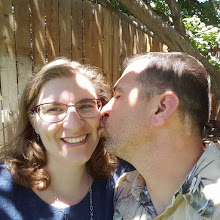I've often heard it said that there's a fine line between concern and worry. I think when it comes to the deployment of a loved one, that line is perforated.
It's normal when you're apart from your spouse for extended periods to think about them and what they're doing when you wake up in the morning, and when you're head hits the pillow at night...and about a million other times during the day. It's normal when you know they're in a dangerous part of the world, to scan the headlines first thing in the morning to see if anything happened in that part of the world.
As we prepare for my husband's deployment, it's prudent for me to consider what I should do if he doesn't come back. We have two kids, and I need to plan for our future. We've been married nearly 13 years; I met my hubby when I was 16. We were engaged when I was 17, and married when I was barely 18. We've grown up together. We've influenced one another incredibly. When I think about the possibility of him not coming home, all of these thoughts go through my head. My chest starts to hurt, and I feel like I can't breathe. Without even noticing, I've crossed over into the realm of worry from the perfectly sane place of concern.
If I cannot keep myself in the land of normal concern, what am I going to do with two kiddos who already worry incessantly that their father or I will die? These two already spend a great deal of their time in fearful worry.
Sigh. I suppose if life were too easy, I'd be bored with it.
...sometimes boring sounds nice though!
Are We in Danger of Living Like the Rich Fool?
23 hours ago


